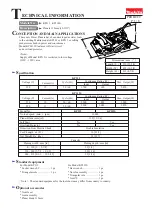
INTRODUCTION AND SAFETY INFORMATION
1-3
6.
Attach the safety chain to the tractor recommended
drawbar support. Provide only enough slack in the
chain for turning. Do not attach the safety chain to an
intermediate support. Safety chain must have rating
greater than the gross weight of the towed
implement(s). Replace the safety chain if it is worn or
damaged in any way.
7.
Verify that all hydraulic hoses and electrical wiring
between the tractor and implement are safely routed
to avoid damage.
8.
Check implement tire pressure for correct inflation.
Verify that lug nuts are properly torqued before
transporting.
9.
Install all transport locks and pins before
transporting.
10.
Never allow riders on the implement.
11.
Maximum transport speed for the field cultivator
is 20 mph, regardless of the tractor capabilities
.
Excessive speed may result in loss of control of the
tractor and implement, reduced braking, or failure of
the implement tires and/or structure.Slow down when
road surface conditions are poor or rough, or when
driving on inclines. Reduce speed when turning, on
curves and slopes, to avoid tipping. Equipment
altered other than the place of manufacture, may
further reduce the maximum transport speed.
12.
Avoid overhead power lines. Serious injury or death
can result. Electrocution can occur without direct
contact. Know the transport height and width of the
implement before transporting. Attachments can
increase the height and width of the implement.
Attaching, Detaching, and
Storage
1.
Do not stand between the tractor and implement
when attaching or detaching implement unless both
are not moving.
2.
Block implement so it will not roll when unhitched
from the tractor.
3.
Store in an area where children normally do not play.
Maintenance Safety
1.
Understand the procedure before doing the work.
Use proper tools and equipment.
2.
Make sure all moving parts have stopped.
3.
Do not make adjustments or lubricate implement
while it is in motion.
4.
Block the implement so it will not roll when working
on or under it to prevent injury.
5.
Install hydraulic cylinder lockouts, or lower equipment
to the ground before servicing.
High Pressure Fluid Safety
1.
Escaping fluid under pressure can be nearly invisible
and have enough force to penetrate the skin causing
serious injury. Use a piece of cardboard, rather than
hands, to search for suspected leaks.
2.
Any fluid injected into the skin must be surgically
removed within a few hours or gangrene may result.
3.
Avoid the hazard by relieving pressure before
disconnecting hydraulic lines.
Protective Equipment
1.
Wear protective clothing and equipment.
2.
Wear clothing and equipment appropriate for the job.
Avoid loose fitting clothing.
3.
Because prolonged exposure to loud noise can
cause hearing impairment or hearing loss, wear
suitable hearing protection, such as earmuffs or
earplugs.
Chemical Safety
1.
Agricultural chemicals can be dangerous. Improper
use can seriously injure persons, animals, plants, soil
and property.
2.
Read chemical manufacture’s instructions and store
or dispose of unused chemicals as specified.
3.
Handle chemicals with care and avoid inhaling
smoke from any type of chemical fire.
4.
Store or dispose of unused chemicals as specified by
the chemical manufacturer.
Prepare for Emergencies
1.
Keep a First Aid Kit and Fire Extinguisher handy.
2.
Keep emergency numbers for doctor, ambulance,
hospital and fire department near the phone.
Summary of Contents for 9630FH
Page 44: ...2 36 F 1105 1220 STANDARD SPECIFICATIONS Table provided for general use NOTES...
Page 62: ...3 18 F 1105 1120 ASSEMBLY INSTRUCTIONS Table provided for general use NOTES...
Page 67: ...ASSEMBLY INSTRUCTIONS 3 23 Table provided for general use NOTES...
Page 83: ...OPERATION AND MAINTENANCE 4 3 Table provided for general use NOTES...
Page 95: ...OPERATION AND MAINTENANCE 4 15 Table provided for general use NOTES...








































